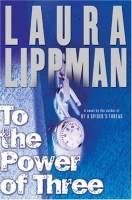



September 2026
"One of the season's most powerful new novels is Laura Lippman's To the Power of Three, a gripping tale that is a mystery only in the same sense as To Kill a Mockingbird was.
This is a brilliant, insightful, moving tale of three girls, best friends forever, whose lives crumble when a shooting at their suburban Baltimore high school leaves one injured, one dead and one dying ...
The troika of teenagers who form the center of the novel are as real, as intriguing and as heartbreaking as any characters you will ever read about in a whodunit. To the Power of Three is the best mystery novel of 2026 so far.
David Montgomery
Chicago Sun-TimesThe Boy of Summer
Another Harry Potter season has come and gone without any help from me. I approve of the Harry phenomenon in principle. It's a great boon to some of my favorite independent bookstores. And as a series writer, I like the idea of training young readers to follow a set group of characters as they grow and change.
But I've never fallen under Harry's spell, although I read the first one, or maybe it was the second. This isn't a knock on J.K. Rowling's formidable skills, but more a consequence, I suspect, of not being a parent -- and having grown up with a healthy and diverse diet of magic-themed books. Been there, read that. My childhood reading list included the entire Oz series -- Baum and Thompson -- C.S. Lewis's Narnia books and E. Nesbit's stories about ordinary children thrust into extraordinary circumstances, particularly the siblings in Five Children and It and The Phoenix in the Carpet.
My favorite was Edward Eager, who died in 1964 at the age of 53. When those millions of Harry Potter readers finally put down their oversize volumes, why don't they turn to these witty -- and considerably tighter -- books? I suspect it's in part because the books are mildly dated. Not old enough to be historical, but clearly not of modern times.
More dauntingly, however, Eager's books rely on the idea that certain literary allusions will be recognized, understood, and appreciated. The children in Eager's books are voracious readers and their common cultural references include the Oz books, Little Women, Ivanhoe, the Arthurian legends, Uncle Tom's Cabin, the Betsy-Tacy books, Charles Dickens, William Shakespeare and Laura Ingalls Wilder. Can the books be read without a foundation in these classics? Yes, but they're not as fun.
According to the biography included in current editions of his books, Eager was keen that every book he wrote include an homage to Nesbit, "whom he considered the best children's writer of all time -- 'so that any child who likes my books and doesn't know hers may be led back to the master of us all.' "
Additional biographical information on Eager is scant. Born in Toledo, he graduated from Harvard and worked as a successful lyricist and playwright, although his work in those fields did not prove as timeless as his children's books. It is said that he turned to writing children's books when he couldn't find things to read to his son, Fritz.
I always imagined him as very much like the father described in my sentimental favorite, Knight's Castle -- "an understanding parent, often quite helpful and willing about such important things as building a rabbit hutch in the backyard or hanging the swing from the biggest oak tree. And even though he would say he wasn't good with his hands (which was true), still part of the rabbit hutch stayed together quite nicely (though all the rabbits got away through the part that didn't), and one year the swing didn't fall down till nearly the end of the summer."
Eager and his characters divined the rules of magic: We find it, we use it, we tame it, we thwart it, we lose it. In Half Magic, generally considered Eager's best book, the talisman is a strange coin that grants wishes by halves. It takes a few misfires for Jane, Mark, Katharine and Martha to understand its rules. And even once the rules are clear, an absentminded moment can create chaos. Ultimately, the magic ends, for magic in Eager's books is always finite -- and, suitably, confined to summer. But then a new child finds the coin -- or checks out the plump red book, or arrives at the thyme garden on the coast - and the reader is left with the reassuring notion that someone, somewhere, is having an adventure.
Two of Eager's later books -- Magic or Not, The Well-Wishers -- fudged the fantasy factor, suggesting that sheer belief is enough to make things happen. Those who know the film Big Fish will recognize the conceit; real life can become magical if one's imagination is rich enough.
Eager also did well by both genders, writing boys and girls that were anything but stereotypical. In Knight's Castle, he begins this way: "It happened just the other day, to a boy named Roger. Most of it happened to his sister Ann, too, but she was a girl and didn't count, or at least that's what Roger thought, or at least he thought that in the beginning." [emphasis added] In fact, Ann is the intellectual in the group and her cousin Eliza is a boisterous, aggressive girl, but ultimately well-meaning. There are lots of lively girls in Eager's fiction, as well as bookish boys who anything but nerds.
I've always liked Knight's Castle because it's set in my hometown of Baltimore and plays with the idea of popularculture, interweaving the novel Ivanhoe with its Technicolor recreation. In fact, one can read Knight's Castle as an allegory on the dangers of fan-fic, or what happens when one tinkers with beloved characters and stories. But I'll leave that discussion to this guy.
| Home | Books | FAQ | | Archives | E-mail | Newsletter |
| Biography | Writings | Interviews | Links | Search |

